It’s taken a huge range of public service workers to keep the country going during COVID-19 and a series of lockdowns. Not all of them get the attention they deserve. Demetrios Matheou speaks to two UNISON members who have played their own, vital role during the first year of the pandemic. Photos: Steve Forrest
Lucy Wild, bus station manager
It’s early January and the country is in the early days of its third national lockdown. While millions of people are working from home, and the streets are mostly empty, bus station manager Lucy Wild and her team are in ‘the office’ as usual – that’s to say, Huddersfield Bus Station.
Their task: to keep the station open for the buses that will transport key workers to their essential jobs in hospitals and elsewhere in West Yorkshire throughout the crisis.
As a result, Lucy and her team are themselves key workers, absolutely essential if hospital staff, homecare workers, police and school staff and many others are to get to work, saving lives and keeping society afloat.
After a long career as a police community support officer (PCSO), four years ago Lucy switched paths and became a bus station manager for the West Yorkshire Combined Authority: briefly in Leeds, then at Bradford Interchange, a combined train and bus station, where she was during the first lockdown, before moving to Huddersfield in the autumn, where she was in place for the second.
While six bus operators run the buses and are responsible for their drivers, the authority owns the station. “We’re like landlords. They come in and use our station and have to follow our rules,” Lucy says. Her role is to maintain the massive premises, overseeing necessary repairs, ensuring health and safety for staff and customers alike and, as she puts it, “Getting out on the concourse. It’s important for the public to see management.”
If a member of the public feels poorly and they’ve thrown up all over the concourse, my staff have got to deal with that
Lucy’s team comprises three customer care assistants, who deal with the public and clean the station, and four security staff; she also liaises with the Travel Centre team.
She charmingly likens a bus station to “a really, really big house”, adding: “It’s like dealing with repairs in your home – you’ve got to make sure it’s safe for you and your family. I’ve got to make the station safe for my staff, for me, and more importantly for members of the public.”
Of course, the scale is quite different. Day-to-day, she has to know the right contractor for a range of specific items that readers won’t find indoors, from automatic doors to CCTV.
And during the pandemic, her responsibility has been massive. Keeping the station running during lockdown is one thing; when restrictions are lifted, more than 33,000 people use the station every day, with the health risk growing accordingly.
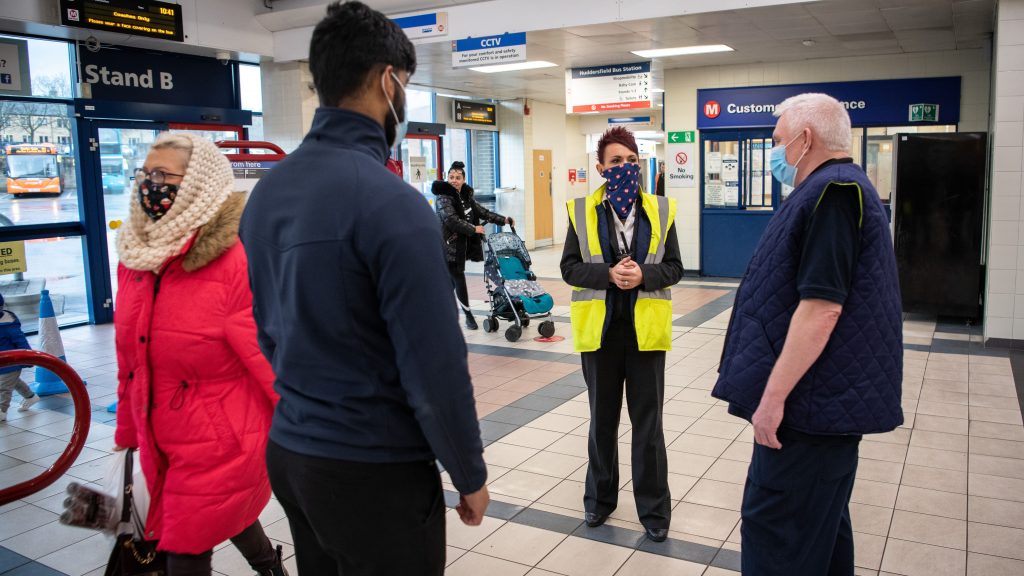
For COVID she introduced signage reminding people of the need for face coverings and social distancing, with a Tannoy announcement doing the same every 20 minutes; reorganised bus stands with distancing in mind; ensured regular cleaning and the availability of hand gels in toilets; amended risk assessments for staff and contractors, with details as minute as what pen a contractor uses when they sign in.
And she’s arranged PPE for her staff. “We’re exempt from wearing PPE, even now, but we do wear it because I feel it’s important. If you’re not wearing a face covering and a member of the public has been told to wear one, it doesn’t look very good.
“Also, if there’s an incident where a member of the public feels poorly and they’ve thrown up all over the concourse, my staff have got to deal with that. So we have things in place to make our necks feel a little bit safer.”
In between lockdowns, Lucy has teamed with Kirklees Council, which has a stall on the concourse offering COVID information and masks. The station team itself regularly offers masks to those commuters not wearing them, along with hand sanitiser and information.
Another huge consideration for anyone working in a transport hub – anti-social behaviour – has become even more significant when social distancing is so important.
“It’s so difficult to manage anti-social behaviour,” Lucy says. “We have an ‘ask to leave’ policy. If someone’s causing problems, we politely ask them to leave. If they refuse, we ring the police, who hopefully come and remove them from site.”
We’re going to be talking about this in years to come, and I’m so grateful I can tell my daughter what I did
Her own years as a PCSO have put her in good stead. “As a PCSO you’ve got to use your wits, your common sense, to get yourself out of a potentially dangerous environment. I can talk myself out of a lot of situations.”
It did get more difficult last year when restrictions were lifted and masks made mandatory inside stations, but Lucy and her team maintained the same gently- gently approach, offering masks while not demanding compliance. “We wouldn’t go in guns blazing.”
With the third lockdown underway, Lucy observes that “It’s just automatic. We know now, what we’re doing.” But the quietly heroic effort doesn’t come easily.
“I remember driving to work the day after Boris announced the first lockdown. I was so scared! I thought: ‘This is for real. This is really happening.’ While we were quieter during that first lockdown, there was always that tension and fear.
“I’m thinking about looking after my staff, but I’ve also got a little girl, who has to go to school during lockdown because I’m a key worker. So she’s at risk every day, I’m at risk every day, and every single day I’m worried and panicking about it. I think it’s the same for every bus station manager and their teams in the country.”
And like so many, Lucy has now had COVID herself. Despite that, and all the pressures of her job, her primary emotion is a deep sense of pride.
“I know it sounds really silly, but we’re going to be talking about this in years to come, and I am so grateful that I can tell my daughter what I did. She’s only eight, she’ll remember some of it, but she’s going to be asking questions. ‘Oh mummy, what did you do during COVID?’ I’m very proud of my job.”
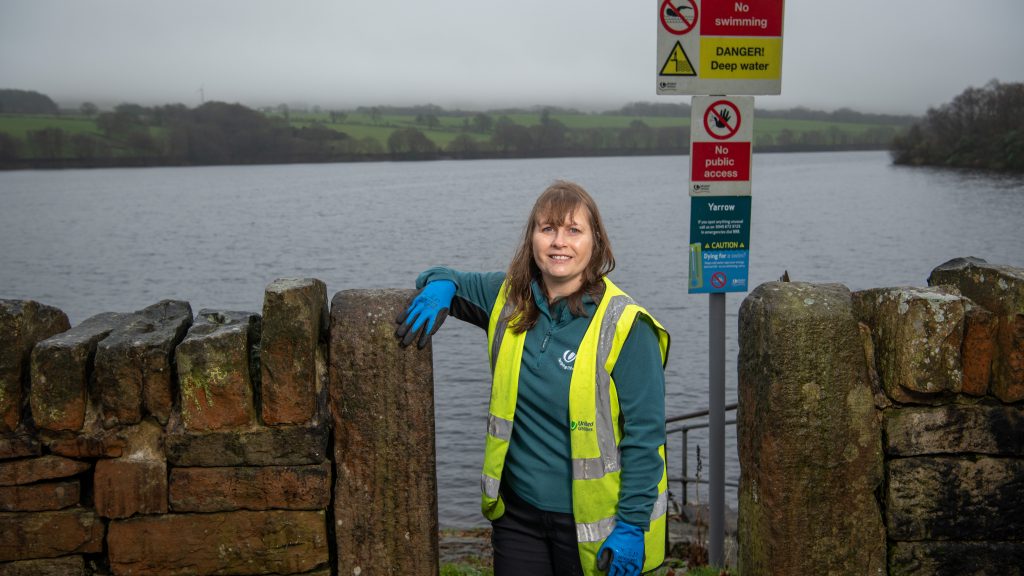
Hazel Gregory, catchment controller
For a lover of the outdoors, Hazel Gregory has something of a dream job. A catchment controller for waterHazel Gregory, catchment controller company United Utilities in the North West, she gets to roam acres of countryside every day, from reservoirs to woods and moorland – with no one day the same. It’s a hugely important role, too, as Hazel and her colleagues are responsible for ensuring the flow of fresh water to three million homes and businesses.
However, coronavirus suddenly found a way of turning Hazel’s world inside out. Remember all those news stories about shameless lockdown breakers streaming towards the countryside? Hazel knows a thing or two about that.
United Utilities’ operation involves hundreds of reservoirs, treatment works and pumping stations, with a workforce that includes UNISON members in a variety of roles – from process controllers, water quality officers, network controllers and customer service advisors, to those managing woodlands, biodiversity, and all the tenants on the company’s landholdings.
Hazel works with six other catchment controllers in keeping an eye on eight connected reservoirs centred on Lower Rivington Reservoir in Lancashire, the 5,000 hectares of catchment land from which water flows into them, and public recreational areas.
On bank holidays thousands of people walk the paths and visit cafes and other facilities. Unfortunately, during the hot spring and summer of 2020, including the first lockdown and the highly confused period afterwards, “Every day was like a bank holiday – for months,” Hazel says. “It was a nightmare. Because of COVID, and furlough, and the good weather, we had a number of issues involving people trespassing on the company’s sites, in defiance of both by-laws and the lockdown.”
These included swimming in reservoirs, making BBQs that led to moorland fires, camping, parties, vandalism, taking dinghies out on the reservoirs and, on one occasion, even scuba diving. The litter created was “astronomical”, she says. And sometimes the fire brigade would need to deal with the fires, with perhaps seven or eight at once.
Some of us felt extremely vulnerable when having to challenge members of the public face to face
The behaviour of the public creates a dual problem: sometimes putting people’s lives at risk – reservoirs are very dangerous bodies of water – while at the same endangering the habitat and wildlife and compromising water quality.
Hazel sums up the terrible dilemma for staff in her position. “It’s never nice approaching people to say, ‘Stop what you’re doing. You can’t have your party. You can’t swim, you have to socially distance’. And all too often, staff were either ignored or told where to go.
“Many of us felt extremely vulnerable when having to challenge members of the public face-to-face. Some were threatened or verbally abused, just for doing their job. At the same time, we are always told not to put ourselves at risk. Nothing we do is worth getting hurt for. If there’s an issue, just leave.”
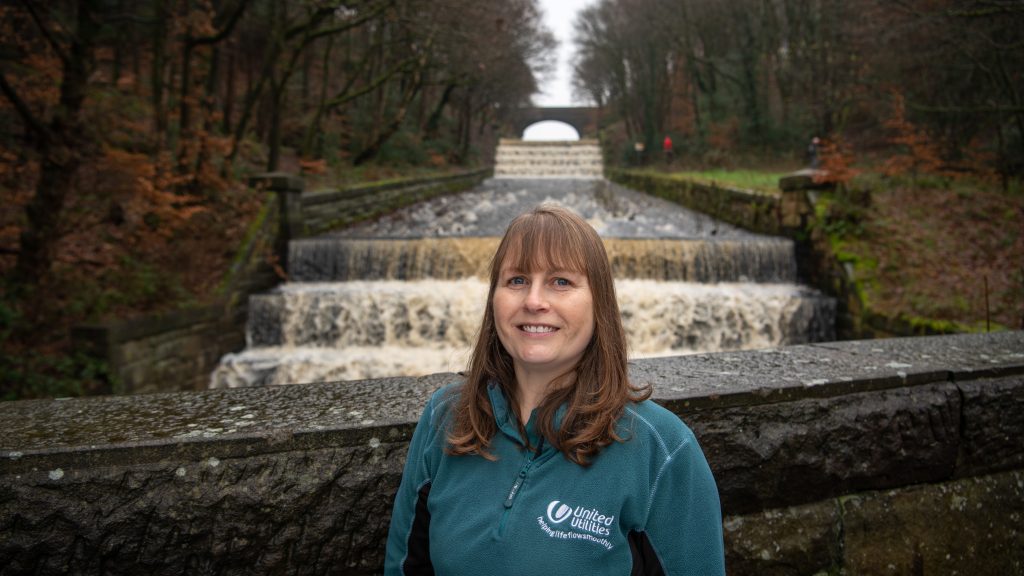
I first touched base with Hazel during that difficult summer. When we catch up on the phone in January, I’m surprised to discover that even in winter people continue to break lockdown in droves.
“It’s not as bad now as the summer. But we are still having a lot of visitors at the weekends – thousands coming from miles away. Mostly walking and cycling, but because we’ve had snow there have been an awful lot of people coming out with sledges.
“You just want to say to these people, ‘There’s a pandemic. Have you seen the pictures of the NHS and everything they’re having to deal with? And you’re coming out here as if it’s just a normal day’.”
What we do is vital in getting water to everybody’s home
That said, Hazel admits to being more relaxed than last year, partly because she’s now had COVID herself (“It gives you hope that you’ve got immunity, whereas before it was quite a daunting situation”) and partly because United Utilities’ efforts to combat its staffs’ problems are beginning to bear fruit.
The company introduced a dedicated, anti-social hotline in July, phone and email, which staff can use to report incidents as they arise. The result is an information resource showing the types of problems and suggesting solutions – including the use of external companies or volunteers to help with litter collection, and security companies to deal with gatherings and move on cars that are blocking access areas.
Hazel has a degree in environmental protection. She’s worked with United Utilities since 2004, first as a countryside ranger, before becoming a catchment controller and adding reservoirs and dams to her responsibilities. Her unique skillset includes how to use chainsaws, ‘confined spaces training’ and numerous countryside skills. She’s also been the branch health and safety rep for eight years.
The past year has impressed upon Hazel the importance of their work. “During the first lockdown, and that lovely weather, we probably had two or three months of very low rainfall. And everybody was doing more handwashing – more washing of everything – to try to combat COVID, so there was even more demand for water.
“We were keeping a close eye on levels, to make sure we could maintain the supply. We were super aware that what we do is vital in getting that water to everybody’s home.”
Saving the nation: read more about UNISON’s heroic frontline workers

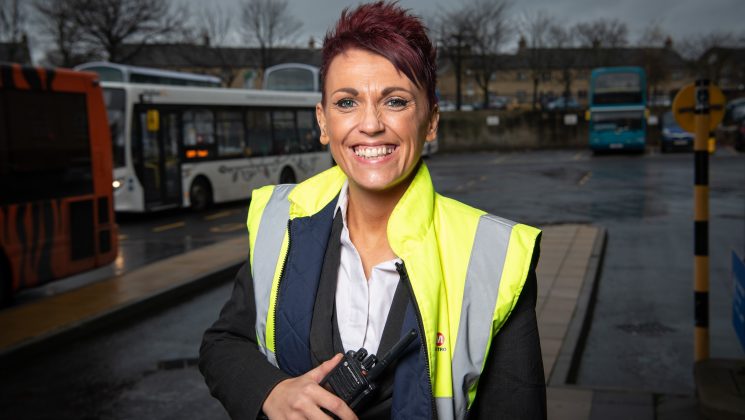

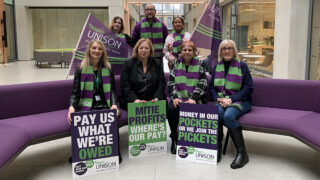


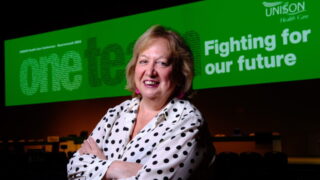
Union members, low pay, Covid-19, promises given but never kept on pay and working conditions then election time comes around always made top of the list for awards then always forgotten by those in power, the unsung heroes, the Hazels and Lucy of this world deserve better from people who continue to ignore policy and procedures and have the same principles like visiting second homes in Greece or testing eye sights on a castle in County Durham which sits on top of a hill, most sickening due to being raised in Newcastle myself, the key workers and care workers to every worker in low paid employment deserve better and the fight should go on until they get better. remember how worried we all were at the start of the pandemic and should still be, well now is the time to acknowledge those who have supported the nation, the people, in it’s time of need, some continue to make Churchill like sayings whenever they feel support is needed for any misinformation given out, well what should have been a right years ago proper pay awards for those who need and deserve it the most.